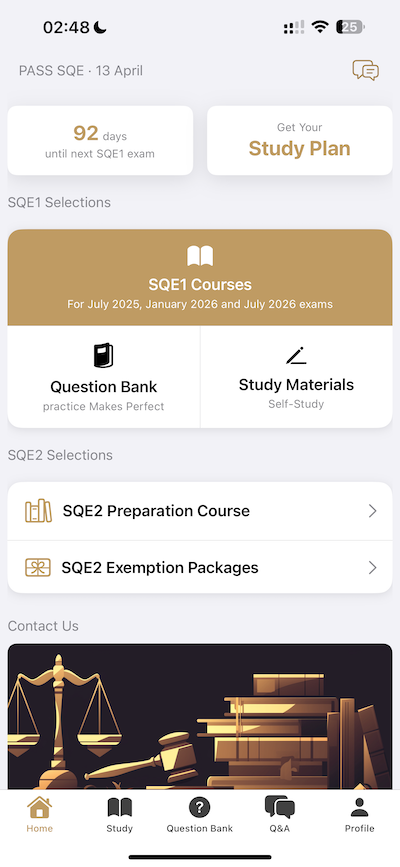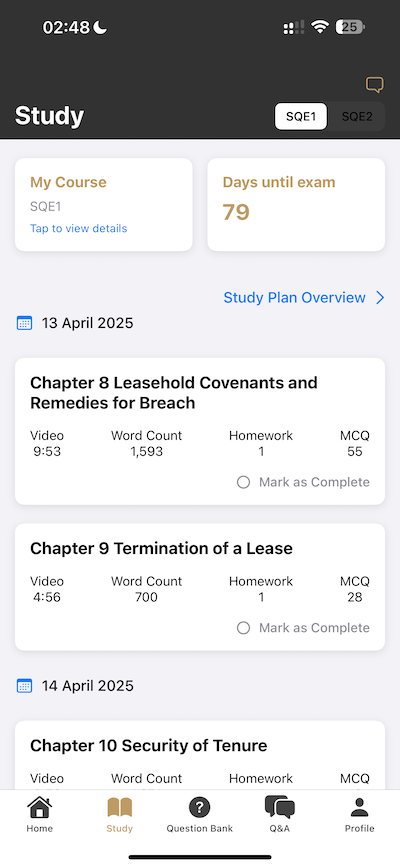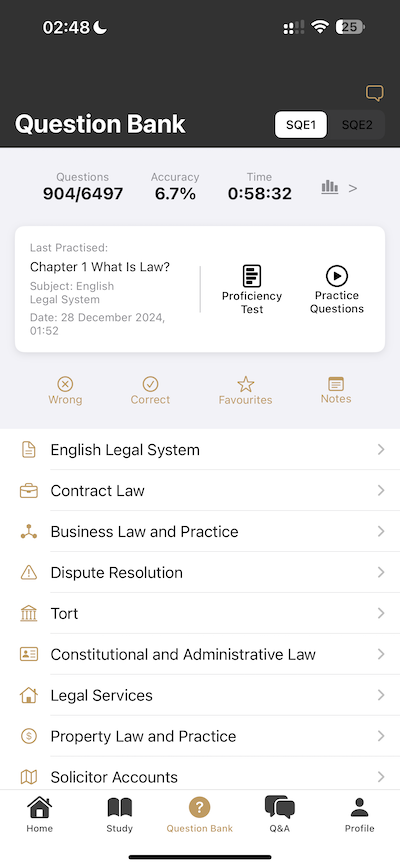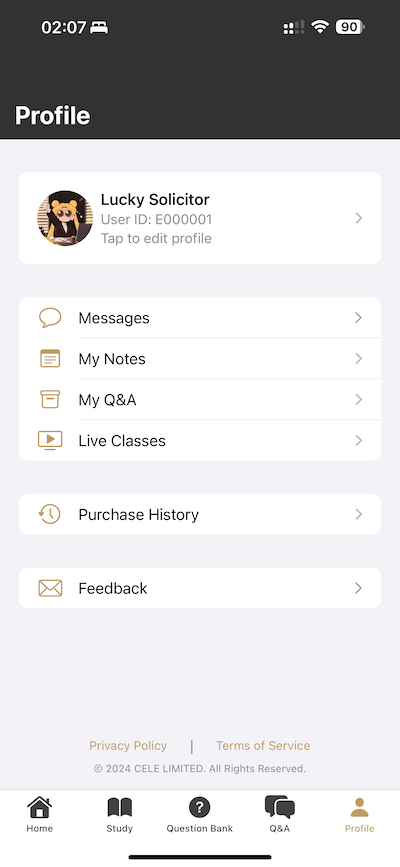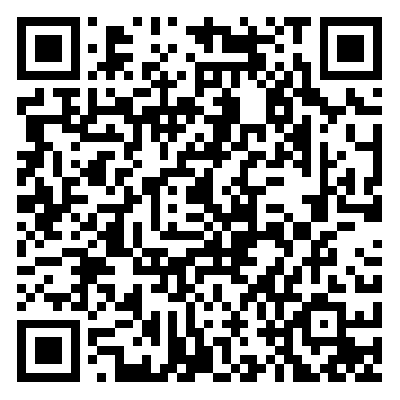As the Solicitors Qualifying Examination (SQE) system progresses, the Solicitors Regulation Authority (SRA) implemented significant updates to the SQE exemption policy in May 2025. For legal practitioners from mainland China, Hong Kong, Japan, South Korea, and other jurisdictions seeking to become qualified solicitors in England and Wales through the SQE route, understanding the latest exemption regulations is crucial. This article provides an in-depth analysis of the SRA's exemption policy background and recent changes, QWE (Qualifying Work Experience) exemption applicability and documentation requirements, SQE2 examination exemption application criteria, SRA review processes and common issues, and introduces CELE SQE's exemption services and advantages to help you efficiently plan your path to becoming an English solicitor.
Important Notice
The SRA's updated "individual exemptions" guidance published on 14 May 2025 has tightened exemption application criteria, ensuring only foreign practitioners who meet English and Welsh solicitor standards can be exempted from relevant examination components. Foreign lawyers need to more carefully assess their qualifications to ensure compliance with the new requirements.
Background: SQE Exemption Policy and Key Points of the 2025 New Rules
SQE exemptions refer to the ability of "qualified lawyers" who have already obtained practising qualifications in certain jurisdictions to be exempted from parts of the SQE examination. Since the SQE system was introduced in 2021, foreign practising lawyers have been able to apply for exemptions from certain examination components based on their qualifications and experience, avoiding duplicated assessments. However, the SRA updated its "individual exemptions" guidance on 14 May 2025, clarifying several new requirements and restrictions:
Core Changes in the 2025 New Rules
Complete Subject Exemptions Only, No Partial Exemptions
The SRA only permits exemptions for complete SQE assessment components, such as SQE1's FLK1 or FLK2, or the entire SQE2 examination. Exemptions for partial content within subjects are not available. This means applicants can only apply for exemption from entire examinations, not specific questions or modules within them.
- No retrospective exemption applications after examination: If an applicant has already sat and failed a particular SQE examination component, or is awaiting results, they cannot subsequently apply for exemption for that component. Once an examination has been failed, it must be retaken and passed to meet the qualification requirements. Therefore, candidates cannot harbour the illusion of "applying for exemption to bypass examination after failing" - this avenue has been explicitly closed by the SRA.
- Qualified lawyers only may apply: Exemptions are limited to qualified lawyers, meaning those who have already obtained legally practising professional qualifications in England and Wales or other jurisdictions. In other words, applicants must already be formally practising (holding a practising certificate) and typically need to provide a certificate of good standing from their local law society or regulatory authority for SRA verification. For individuals who have not yet obtained any practising qualification, exemption routes are not applicable.
- New practical experience requirements: For SQE2 examination exemptions, the SRA now requires applicants to have at least two years of legal practice work experience and demonstrate practising scope equivalent to English and Welsh solicitors. This two-year experience must be post-qualification practice (or include mandatory training periods required as part of the qualification process in their jurisdiction), excluding pre-qualification internships or work experience. This requirement ensures exemption applicants have reached the competency threshold of newly qualified English solicitors.
- English/Welsh language proficiency evidence: The new rules also emphasise that if granted exemption from the SQE2 examination, applicants must separately demonstrate English or Welsh language proficiency before formally applying for practising registration. Since they have not passed the SQE2 examination (which includes oral and written proficiency assessment), the SRA requires alternative verification of language competency. This typically requires applicants to provide evidence that their foreign legal qualification was obtained in an English/Welsh language environment, or submit immigration-recognised language test results (such as IELTS 7.5 or above). These language requirements are strict and have generated some discussion, but the SRA currently maintains this high standard to ensure practising communication competency.
Summary: Under the new rules, the SRA has tightened exemption application criteria, ensuring only foreign practitioners who meet English and Welsh solicitor standards can be exempted from relevant examination components. This places higher demands on potential applicants but also provides clear guidance for everyone to assess whether their qualifications meet exemption criteria.
QWE Exemption: Which Situations Allow Exemption from Qualifying Work Experience (QWE)?
Qualifying Work Experience (QWE) is the two years of full-time (or equivalent) legal practice experience required for candidates under the SQE route. However, for applicants who have already obtained overseas legal qualifications, the SRA actually exempts QWE requirements. This means if you are already a licensed practising lawyer overseas, you do not need to complete an additional two years of QWE when applying for English solicitor qualification. This policy significantly reduces the burden of duplicated work experience accumulation for foreign lawyers.
Automatic Exemption Policy
According to Law Society guidance: "Fully qualified foreign lawyers are exempt from any QWE requirements". The SRA has also confirmed in internal communications that even newly qualified overseas lawyers (with limited practice time) are exempt from additional QWE demonstration when choosing the SQE examination route, as the SQE2 examination itself tests necessary practical skills.
It's important to note that QWE exemption does not require a separate application. It is a policy that applies automatically based on the applicant's status. If you are an overseas qualified practising lawyer, when applying for an English practising certificate after passing SQE examinations, the SRA will verify your lawyer status by requiring submission of a "Certificate of Good Standing" and similar documents. Once confirmed as a "qualified lawyer", the two-year QWE requirement is deemed satisfied without needing QWE confirmation signed by English solicitors.
Typical Eligible Candidates
For example, a lawyer who has passed China's National Judicial Examination and is practising, a licensed Hong Kong solicitor, or a Japanese bengoshi (lawyer) - as long as their legal qualification is recognised, they do not need to complete additional English QWE. If you have not yet obtained legal qualification in any jurisdiction, you would need to complete QWE according to SQE requirements, with English qualified solicitors signing off on your practical experience.
Documentation Preparation
Although QWE logs are not required, foreign lawyers should prepare documents proving their qualifications and experience when applying for practising certificates. For example, you need to submit practising certificates issued by your jurisdiction's law society or regulatory body (typically including commencement dates and good standing records). If these documents are not in English, certified translations must be provided. Comprehensive qualification evidence will help the SRA recognise your QWE exemption status, allowing you to bypass the work experience component and focus on passing required SQE examinations.
In summary, for foreign practising lawyers, "QWE exemption" is undoubtedly significant good news. You can concentrate your efforts on examinations themselves or applying for SQE2 exemption, without needing to accumulate two years of local work experience from scratch.
SQE2 Exemption: How Can Foreign Lawyers Be Exempt from SQE2?
SQE2 is a comprehensive assessment of practical legal skills, including client interviewing, legal writing, advocacy, and other competencies - one of the components most hoped for exemption by foreign lawyers. So which overseas practising lawyers can apply for SQE2 examination exemption? According to the latest SRA policy, the following core conditions must be met:
Detailed Application Criteria
- Hold foreign legal professional qualification: As mentioned previously, applicants must be "qualified lawyers", meaning they have already obtained legal professional qualifications overseas with practising rights. This is the basic prerequisite. For example, holding a Chinese solicitor's licence, Hong Kong solicitor's licence, Japanese bengoshi qualification, or passing South Korea's judicial examination and registering as a lawyer all qualify as "qualified lawyers".
- Practice scope equivalent to English and Welsh solicitors: Applicants must possess practising areas equivalent to English solicitors. The SRA specifically lists five core practice areas: criminal litigation, civil litigation (dispute resolution), property law, wills and estate administration, and company law and procedures. Applicants need to demonstrate practising rights in at least one of these litigation or legal business areas within their jurisdiction to prove their qualifications cover aspects of English solicitor practice. This is because SQE2 examinations test practical legal skills in these areas, so applicants should have practice experience in at least one similar area to claim "equivalent standards".
- At least two years of legal practice work experience: The SRA requires foreign lawyers applying for SQE2 exemption to provide no less than two years of professional legal work experience to demonstrate their skills meet English newly qualified solicitor standards. Importantly, these two years should be post-qualification practice experience (or mandatory training periods required during the qualification process in their jurisdiction). Pre-qualification internships/work do not count, as the SRA considers this has not yet reached qualified lawyer threshold. For example, a Hong Kong lawyer who has worked for 3 years, including 2 years post-licensing practice, meets the time requirement; however, a candidate with only post-graduation internship experience but not yet formally practising would not satisfy the criteria.
- Competency standards equivalent to English solicitors: Beyond time and scope requirements, supporting materials submitted by applicants need to demonstrate skill levels meeting English practising solicitor third-stage standards (SRA Professional Competency Standards Level 3). Simply put, you need to have independently handled reasonably complex legal matters in actual work and be competent in the responsibilities expected of practising solicitors. This is typically demonstrated through work samples and supervisory lawyer evaluations.
Foreign lawyers meeting the above criteria can apply for individual exemption to be exempt from sitting the SQE2 practical skills examination. The SRA will comprehensively consider applicants' qualifications, practice areas and duration, provided cases and evidence when reviewing applications, determining whether their skills are "equivalent" to candidates who have sat and passed SQE2.
Typical Eligible Candidates
Generally, lawyers from common law countries or regions with extensive practice experience are more likely to obtain SQE2 exemption. For example, Hong Kong or Singapore solicitors, due to their training and practice environments being similar to England, and potentially involving litigation work, can more easily demonstrate equivalence to SQE2 examination content. Similarly, lawyers from civil law countries, if they have long-term experience in cross-border business and have mastered common law practical skills, also have opportunities to obtain exemption through detailed evidence. However, if your practice area is too specialised or your legal system differs significantly from England, obtaining exemption becomes relatively more challenging. Each application is individually assessed by the SRA - there are no automatic exemptions, so comprehensive supporting materials are essential.
Documentation Preparation and Evidence Requirements
To convince the SRA you have the competency to be exempt from SQE2, preparation should be quite detailed:
- Practising certificates: Provide practising certificates from your jurisdiction, certificates of good standing (including practice commencement dates). This proves your basic application eligibility.
- Practice cases and work samples: The SRA encourages applicants to submit detailed case descriptions, demonstrating their application of legal skills in the core practice areas mentioned above. You should select one to two typical cases, explaining the background, steps you took and legal advice provided, relevant statutes or precedents cited, and final outcomes. Attach relevant work product samples (such as legal opinion letters with track changes, litigation documents, client correspondence), ensuring sensitive information is properly redacted (anonymised).
- Supervisor or colleague reference letters: Strong reference letters are crucial. The SRA clearly states that without appropriate reference evidence, exemption is very likely to be refused. Your referees (such as direct supervisors or senior partners) should confirm in their letters that they have read your application and work samples, verify this work was indeed completed or participated in by you personally, and evaluate your competency as meeting required standards. Referees' own qualification certificates (such as their practising certificates or good standing certificates) must also be provided to prove their qualification to provide such endorsement.
- Other considerations: If your practice scope does not cover all five major areas, you need to detail relevant experience in uncovered areas in the designated section of the application form. Additionally, if your supporting materials or reference letters are not in English, certified translations must be provided to ensure unimpeded SRA review.
Application Fees and Time Costs
Submitting an SQE2 exemption application requires payment of £265 review fee. After the SRA receives a complete application, decisions are generally made within 180 days. During this six-month period, the SRA may send materials to external assessment experts for review, so applicants need to be patient. It's recommended to plan application timing early to avoid missing preferred SQE1 examination slots or overall practising planning milestones due to waiting for results.
It's worth noting that if you cannot meet exemption requirements, or if your exemption application is refused, you can still choose to complete SQE2 through examination. The SRA emphasises that when exemption standards cannot be met, applicants should honestly sit the examination. For example, a young Japanese lawyer with less than two years of practice may not currently qualify for exemption, making direct preparation for and passing SQE2 examination a more feasible path. Exemption is not the only route to English solicitor qualification - examination remains the fallback option.
SRA Exemption Application Process, Review Times and Common Issues Analysis
After meeting criteria and preparing materials, the next step is submitting exemption applications according to SRA-specified processes. Understanding process details and common misconceptions helps improve application success rates and reduce timelines.
Application Process Overview
Register and log into mySRA account
All exemption applications are submitted through the SRA's online system. First, create a mySRA account (if not already registered) and complete personal details. In "My Profile", add all legal qualifications and practice jurisdictions you have obtained (including qualification dates, etc.). Only after completely updating this information will the system allow you to initiate exemption applications.
Initiate application and complete forms
Log into mySRA homepage, select "Start new application", then choose "Apply for qualified lawyer exemption from the SQE assessments". Follow prompts to complete various sections of the online form. Note: If your situation falls under SRA's existing "agreed exemptions" for certain jurisdictions (very rare circumstances), the form will be simpler; otherwise, as an "individual exemption", more detailed content is required.
Download offline forms (if required)
Some application content may require using PDF/Word form templates provided by the SRA to complete detailed information (such as case details), then upload to the system. Please download relevant files according to guidance and complete item by item following instructions. Carefully read guidance notes to ensure no required sections are missed.
Upload supporting documents
After completing online forms, the system will prompt you to upload various supporting materials, including qualification certificates, work experience and competency evidence, reference letters and referee qualifications, translations, etc. Ensure uploaded electronic files are clear and readable, with sensitive information properly redacted.
Submit and pay fees
After confirming all information is correctly completed and files fully uploaded, submit the application in the system and pay the £265 review fee online. After payment, the application formally enters SRA review process. Note that once submitted, additional exemption requests cannot be added to the same application.
Await review results
After receiving applications, the SRA conducts initial verification, then may refer to independent experts for assessment of evidence adequacy. The SRA officially states decisions are generally made within 180 days. Based on experience, if materials are comprehensive and sufficient without dispute, results may come within a few months; but if the SRA requires additional materials, you will be notified by email.
Results and follow-up
If exemption is granted, you need to confirm this exemption status in the SQE examination management system (Kaplan's SQE account). Thereafter, once you pass other required examinations (such as SQE1), you can apply for practising registration. If exemption is not granted, you can decide whether to reapply based on feedback or pursue the examination route.
Common Issues and Misconception Analysis
Misconception 1: Exemption equals automatic qualification
Actually, exemption only allows you to skip certain examination components, not all steps. Even with SQE2 exemption, you still need to pass SQE1 written examination and meet degree and other requirements, plus apply for character and suitability assessment, etc. - no steps are omitted. Exemption just makes the journey slightly shorter, not immediately becoming a solicitor.
Misconception 2: Having foreign legal qualification guarantees SQE2 exemption
This is not the case. As outlined above, the SRA maintains strict exemption standards - merely having an overseas legal title without relevant practice is insufficient. Many applicants assume "I've been practising for many years so should be directly exempt", but if they cannot provide evidence demonstrating possession of skills assessed by SQE2, applications will still be refused. Therefore, don't assume submitting practising certificates is sufficient - the core issue remains demonstrating competency matching in supporting materials.
Misconception 3: Getting exemption means no need to worry about language proficiency
Actually, if you are exempt from SQE2, language requirements become a separate hurdle. The SRA currently requires IELTS 7.5 or equivalent English proficiency evidence. Many applicants overlook this point, only discovering they need to take language tests after exemption approval. Therefore, early preparation for language examinations or evidence (for example, if your legal education or qualifying examinations were conducted entirely in English, this may be used to exempt language testing) is recommended.
Misconception 4: Unsuccessful exemption application means no opportunities
If refused, don't be discouraged. As stated in SRA FAQs, you can reapply after preparing new supplementary materials. Many applicants' first submissions are insufficient, but succeed after strengthening case details and adding more relevant reference letters on the second attempt. Additionally, pursuing examination route is a wise choice - some foreign lawyers initially wanted exemption but found material preparation challenging, switched to intensive examination preparation, and equally obtained qualifications through examination. The ultimate goal of becoming an English solicitor allows flexible adjustment of approaches - successful goal achievement is most important.
In summary, thorough preparation and strict adherence to SRA requirements are the best strategies for improving exemption success rates. If you have questions about processes or materials, timely consultation with SRA officials is also wise. Another way to avoid detours is seeking professional institution assistance, such as one-on-one guidance services provided by CELE SQE, which can significantly improve application quality and efficiency.
CELE SQE Exemption Services Overview and Advantages
Facing complex exemption application processes and strict review requirements, professional support can achieve significant efficiency gains. CELE SQE specialises in SQE examination training and services, dedicated to helping legal practitioners from China and Asia successfully obtain English solicitor qualifications. Beyond regular course training, CELE SQE also provides exemption application-related consultancy services, offering comprehensive support for foreign lawyers under the new regulatory framework.
Main Advantages of CELE SQE
- Professional team with authoritative guidance: CELE possesses a teaching and research team comprising English practising solicitors and renowned law school professors. These experts have thoroughly studied SRA exemption policies and review criteria, providing professional advice tailored to your individual circumstances. For example, the team evaluates whether your practice background meets SQE2 exemption criteria and identifies areas requiring strengthened evidence, avoiding unnecessary application attempts. This authoritative guidance ensures your application direction is correct without taking detours.
- One-on-one material review: During application processes, CELE teams can provide one-on-one material guidance services. From completing every application form item to selecting optimal cases and refining case descriptions, to reference letter preparation - all receive senior consultant oversight. Many applicants feel confused about how to present their experience; CELE can teach you how to package your experience according to SRA competency requirements based on rich case experience, making materials more aligned with review standards.
- Bilingual support for seamless communication: For Chinese native-speaking applicants, CELE provides Chinese-language services, explaining complex English regulations and form requirements. We also assist in reviewing English application material wording and translation quality, ensuring language barriers don't become stumbling blocks. For Japanese and Korean clients, CELE teams are familiar with these countries' legal qualification systems, can communicate in local languages, then translate into English materials meeting SRA requirements, significantly reducing communication misunderstandings.
- Rich resources and QWE opportunities: CELE SQE not only possesses extensive examination preparation resources including thousands of practice questions and mock examinations, but also provides "Qualifying Work Experience (QWE) programmes". This programme collaborates with SRA-recognised English law firms to offer 4-week to 2-year internship/work opportunities for students requiring practical experience. Although qualified foreign lawyers don't need QWE as mentioned earlier, some applicants wish to gain English legal work experience before obtaining British qualifications, or individuals who don't qualify for QWE exemption. Through CELE's arrangements, you can gain valuable experience in English law firms with certified solicitor sign-off, enhancing future practice credentials. Additionally, these resources demonstrate CELE's extensive industry connections and ability to provide one-stop services for clients.
- Keeping pace with policy updates and rich case experience: As an institution specifically serving the SQE population, CELE teams closely monitor SRA policy developments. For example, when the May 2025 exemption new rules were just released, CELE immediately updated guidance strategies to ensure client applications meet latest standards. Previously, CELE has guided numerous lawyers from mainland China and Hong Kong to successfully pass SQE examinations and applications, with some successfully obtaining exemptions. While specific cases cannot be detailed due to confidentiality, these practical experiences give CELE better understanding of what reviewers value, enabling proactive avoidance of common mistakes (such as incomplete materials and inadequate translations mentioned earlier).
In summary, choosing CELE SQE's exemption services means obtaining professional team support, from qualification assessment and material preparation to subsequent examination guidance - comprehensive assistance. For overseas lawyers first encountering the British legal examination system, this undoubtedly significantly reduces exploration costs, taking the crucial first step in international career development more efficiently.
Download PASS SQE App for Free One-on-One Assessment Service
If you're interested in applying for SQE exemptions or want to further understand your qualifications and British practice planning, take immediate action using CELE SQE's free assessment opportunity to create a personalised plan.
How to Get Free Assessment Immediately
- Download PASS SQE Mobile App: CELE has launched the official mobile application - PASS SQE, enabling students to access SQE information and services anytime, anywhere. You can search for "PASS SQE" in the App Store or major Android app stores and download. Through the app, you can browse SQE examination practice questions, course introductions, and comprehensively understand preparation resources.
- Add WeChat consultation: For users accustomed to WeChat, directly scan the QR code below or add CELE's official WeChat ID SQE100 for one-on-one consultation. Explain your situation and requirements - CELE teams will provide free preliminary assessment, informing you whether you meet QWE or SQE2 exemption criteria, what requirements you still lack, and recommended preparation or application plans.
- Book consultation services: Based on free assessment, you can further book CELE's detailed consultation or agency services. Consultants will create personalised timetables for you, such as when to prepare language examinations, when to submit exemption applications, and how to simultaneously prepare for SQE1, ensuring all components connect seamlessly without wasting time.
Contact Information
WeChat ID: SQE100
Email: [email protected]
Website: en.celesqe.com
Call to Action
The 2025 SRA exemption new rules open new opportunity windows for overseas lawyers, but complex requirements also need professional guidance to fully utilise. Through CELE SQE's assistance, you can avoid detours and embark on the English solicitor career journey with greater confidence. Contact CELE teams now or download the PASS SQE App to get your free personalised assessment! Taking this step brings the dream of becoming a qualified solicitor in England and Wales significantly closer.
Wishing every legal professional aspiring to develop on the international stage efficient success in achieving their dreams!


